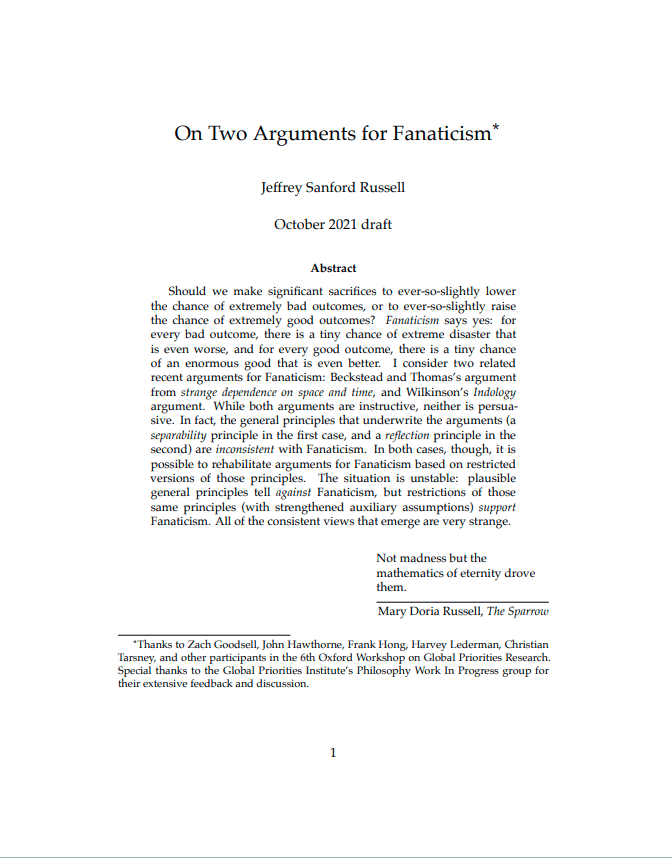On two arguments for Fanaticism
Jeffrey Sanford Russell (University of Southern California)
GPI Working Paper No. 17-2021, published in Noûs
Should we make significant sacrifices to ever-so-slightly lower the chance of extremely bad outcomes, or to ever-so-slightly raise the chance of extremely good outcomes? Fanaticism says yes: for every bad outcome, there is a tiny chance of extreme disaster that is even worse, and for every good outcome, there is a tiny chance of an enormous good that is even better. I consider two related recent arguments for Fanaticism: Beckstead and Thomas’s argument from strange dependence on space and time, and Wilkinson’s Indology argument. While both arguments are instructive, neither is persuasive. In fact, the general principles that underwrite the arguments (a separability principle in the first case, and a reflection principle in the second) are inconsistent with Fanaticism. In both cases, though, it is possible to rehabilitate arguments for Fanaticism based on restricted versions of those principles. The situation is unstable: plausible general principles tell against Fanaticism, but restrictions of those same principles (with strengthened auxiliary assumptions) support Fanaticism. All of the consistent views that emerge are very strange.
Other working papers
Estimating long-term treatment effects without long-term outcome data – David Rhys Bernard (Paris School of Economics)
Estimating long-term impacts of actions is important in many areas but the key difficulty is that long-term outcomes are only observed with a long delay. One alternative approach is to measure the effect on an intermediate outcome or a statistical surrogate and then use this to estimate the long-term effect. …
Longtermism, aggregation, and catastrophic risk – Emma J. Curran (University of Cambridge)
Advocates of longtermism point out that interventions which focus on improving the prospects of people in the very far future will, in expectation, bring about a significant amount of good. Indeed, in expectation, such long-term interventions bring about far more good than their short-term counterparts. As such, longtermists claim we have compelling moral reason to prefer long-term interventions. …
Crying wolf: Warning about societal risks can be reputationally risky – Lucius Caviola (Global Priorities Institute, University of Oxford) et al.
Society relies on expert warnings about large-scale risks like pandemics and natural disasters. Across ten studies (N = 5,342), we demonstrate people’s reluctance to warn about unlikely but large-scale risks because they are concerned about being blamed for being wrong. In particular, warners anticipate that if the risk doesn’t occur, they will be perceived as overly alarmist and responsible for wasting societal resources. This phenomenon appears in the context of natural, technological, and financial risks…

